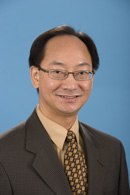Samueli School Names First Associate Dean for Research
Professor William Tang to begin this spring
 The Henry Samueli School of Engineering is pleased to announce that William C. Tang, Ph.D., professor of biomedical engineering and electrical engineering and computer science, has been appointed the first associate dean for research in the
The Henry Samueli School of Engineering is pleased to announce that William C. Tang, Ph.D., professor of biomedical engineering and electrical engineering and computer science, has been appointed the first associate dean for research in the
Tang will primarily assist faculty in their efforts to attract, raise, and obtain research funding, as well as help them establish, build, and maintain quality research programs.
After joining the School in July 2002, Tang founded the Microbiomechanics Laboratory, in addition to serving as the interim chair for the Biomedical Engineering Department from July 2005 to June 2006.
Tang received his B.S., M.S., and Ph.D., in electrical engineering and computer sciences from the
Prior to UC Irvine, Tang held various high-level positions, including research senior at Ford Research Laboratory in Dearborn, Mich., the sensor research manager at Ford Microelectronics, Inc., in Colorado Springs, Colo., the supervisor of the Micro-Electro-Mechanical Systems (MEMS) Technology Group at the Jet Propulsion Laboratory, and program manager at the Defense Advanced Research Projects Agency (DARPA).
While at DARPA, Tang managed the programs in MEMS, Micro Power Generation (MPG), Nano Mechanical Array Signal Processors (NMASP), and Chip-Scale Atomic Clock (CSAC). Through his role as program manager for the largest program within the Microsystem Technology Office (MTO) and the largest government-funding source for United States MEMS research, he provided national-level leadership in shaping the future of MEMS.
He championed, initiated, and established MEMS-enabled programs, including the second phase of MPG, NMASP, and CSAC programs, and published broad agency announcements to solicit, select, and initiate new contracts and grants. Tang also organized semi-annual MEMS principal investigator meetings to promote technical exchanges on to-be-published research results, program coordination, and identification of the next steps in the process, as well as to stimulate discussions for future research.
“I look forward to contributing to The Henry Samueli School of Engineering in facilitating the establishment of forefront engineering research programs and centers that are relevant to both local and national needs. These programs and centers will be one of the key strategies in realizing the School’s vision of engineering the future,” said Tang.
